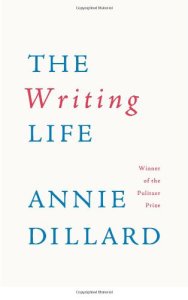By Annie Dillard. 1989
Chapter 1
When you write, you lay out a line of words. The line of words is a miner’s pick, a woodcarver’s gouge, a surgeon’s probe. You wield it and it digs a path to follow. Soon you find yourself deep in new territory. Is it a dead end, or have you located the real subject?
You make the path boldly and follow it fearfully. You go where the path leads. At the end of the path, you find a box canyon. You hammer out reports, dispatch bulletins.
The writing has changed, in your hands, and in a twinkling, from an expression of your notions to an epistemological tool. The new place interests you because it is not clear. You attend.
Putting a book together is interesting and exhilarating. It is sufficiently difficult and complex that it engages all your intelligence. It is life at its most free. Your freedom as a writer is not freedom of expression in the sense of wild blurting; you may not let rip. It is life at its most free, if you are fortunate enough to be able to try it, because you select your materials, invent your task, and pace yourself.
The written word is weak. Many people prefer life to it. Life gets your blood going, and it smells good. Writing is mere writing, literature is mere. It appeals only to the subtlest senses–the imagination’s vision, and the imagination’s hearing–and the moral sense, and the intellect. This writing that you do, that so thrills you, that so rocks and exhilarates you, as if you were dancing next to the band, is barely audible to anyone else.
Chapter 2
How we spend our days is, of course, how we spend our lives. What we do with this hour, and that one, is what we are doing. A schedule defends from chaos and whim. It is a net for catching days. It is a scaffolding on which a worker can stand and labor with both hands at sections of time.
There is no shortage of good days. It is good lives that are hard to come by. A life of good days lived in the senses is not enough. The life of sensation is the life of greed; it requires more and more. The life of the spirit requires less and less; time is ample and its passage sweet.
Chapter 5
It makes more sense to write one big book–a novel or nonfiction narrative–than to write many stories or essays. Into a long, ambitious project you can fit or pour all you possess and learn. A project that takes five years will accumulate all those years’ inventions and richnesses. Much of those years’ reading will feed the work. Further, writing sentences is difficult whatever their subject.
Why are we reading, if not in hope of beauty laid bare, life heightened and its deepest mystery probed? … Why are we reading if not in hope that the writer will magnify and dramatize our days, will illuminate and inspire us with wisdom, courage, and the possibility of meaningfulness, and will press upon our minds the deepest mysteries, so that we may feel again their majesty and power? What do we ever know that is higher than that power which, from time to time, seizes our lives, and reveals us startlingly to ourselves as creatures set down here bewildered? Why does death so catch us by surprise, and why love? We still and always want waking. We should amass half dressed in long lines like tribesmen and shake gourds at each other, to wake up; instead we watch television and miss the show.

